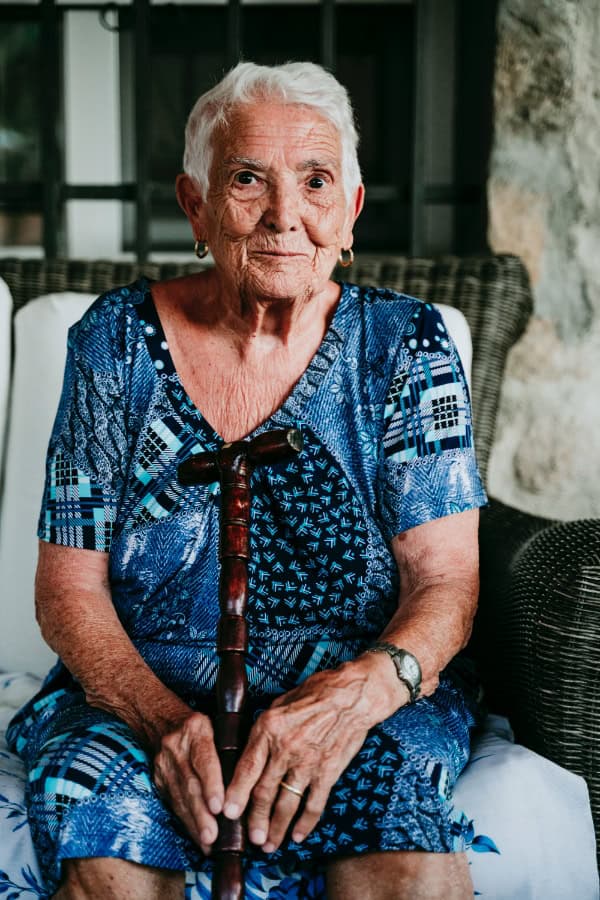Palliative Care for Cancer Patients
Care Services
A cancer diagnosis brings overwhelming challenges—not just the physical symptoms, but the emotional upheaval, difficult decisions, and uncertainty about the…















A cancer diagnosis brings overwhelming challenges—not just the physical symptoms, but the emotional upheaval, difficult decisions, and uncertainty about the future. While oncology treatment focuses on fighting the disease, palliative care focuses on fighting the suffering that comes with it. This specialized approach to care can make an enormous difference in how your loved one experiences their cancer journey, helping them live as fully and comfortably as possible throughout treatment and beyond.
At Serenity Palliative & Hospice Care, we’ve witnessed how palliative care can transform the cancer experience for patients and families across Orange County, Los Angeles, Riverside, and San Bernardino counties. This comprehensive guide will help you understand how palliative care works alongside cancer treatment, when it’s appropriate to consider, and how it can provide hope and comfort during one of life’s most challenging chapters.
Understanding Palliative Care in Cancer Treatment
Palliative care is often misunderstood, with many people thinking it’s only for end-of-life situations. In reality, palliative care is specialized medical care that focuses on improving quality of life for anyone facing a serious illness, including cancer patients at any stage of their journey.
What Palliative Care Provides: Palliative care addresses the whole person, not just the disease. This includes managing physical symptoms like pain, nausea, and fatigue, while also providing emotional support, spiritual care, and assistance with complex medical decisions. The goal is to help your loved one feel as comfortable and supported as possible while they undergo cancer treatment.
Working Alongside Oncology: One of the most important things to understand is that palliative care doesn’t replace cancer treatment—it works alongside it. Your loved one can continue with chemotherapy, radiation, immunotherapy, or other treatments while receiving palliative care. In fact, research shows that cancer patients who receive palliative care early in their treatment often have better outcomes and quality of life.
The Interdisciplinary Team: Palliative care involves a team of specialists including physicians, nurses, social workers, chaplains, and other professionals who work together to address all aspects of your loved one’s wellbeing. This team collaborates closely with the oncology team to ensure coordinated, comprehensive care.
Comfort and Hope: Palliative care is about adding life to days, not just days to life. It helps patients and families focus on what matters most—spending quality time together, maintaining relationships, and finding meaning and comfort even in the midst of illness.
When Cancer Patients Should Consider Palliative Care
The best time to consider palliative care is often earlier than most families expect. Current medical guidelines recommend that palliative care be introduced at the time of diagnosis for patients with advanced cancer, and it can be beneficial at any stage of the disease.
At Diagnosis: For patients diagnosed with advanced or metastatic cancer, palliative care can be invaluable from the very beginning. Starting palliative care early helps establish a support system, manage initial symptoms, and provide guidance as treatment decisions are made.
During Active Treatment: Even when cancer treatment is going well, palliative care can help manage side effects like fatigue, pain, nausea, or anxiety. Many patients find that palliative care helps them tolerate treatment better and maintain their quality of life throughout the process.
When Symptoms Become Difficult: If your loved one is experiencing pain, shortness of breath, loss of appetite, depression, or other symptoms that are interfering with daily life, palliative care can provide specialized expertise in managing these challenges.
After Treatment: Cancer survivors often deal with ongoing effects of treatment, including chronic pain, neuropathy, fatigue, or emotional concerns. Palliative care can help address these long-term issues and support the transition to survivorship.
When Facing Difficult Decisions: Cancer treatment often involves complex decisions about surgery, chemotherapy regimens, clinical trials, or goals of care. Palliative care specialists can help families understand options and make decisions that align with their values and priorities.
Family Distress: If family members are struggling with the emotional impact of cancer, feeling overwhelmed by caregiving responsibilities, or having difficulty communicating with each other about the illness, palliative care can provide crucial support.
Managing Cancer-Related Symptoms Through Palliative Care
Cancer and its treatments can cause numerous symptoms that significantly impact quality of life. Palliative care specialists have expertise in managing these symptoms in ways that complement ongoing cancer treatment.
Pain Management: Cancer-related pain can come from the tumor itself, treatments like surgery or chemotherapy, or procedures like biopsies. Palliative care specialists are experts in pain management, using a combination of medications, non-drug approaches, and interventional techniques to provide relief while allowing patients to remain alert and engaged in life.
Nausea and Vomiting: These common side effects of chemotherapy and radiation can be debilitating. Palliative care teams use advanced anti-nausea medications, dietary modifications, and complementary therapies to help patients maintain nutrition and comfort during treatment.
Fatigue and Weakness: Cancer-related fatigue is different from ordinary tiredness—it’s often overwhelming and doesn’t improve with rest. Palliative care addresses fatigue through energy conservation strategies, treatment of underlying causes like anemia or depression, and helping patients prioritize activities that matter most to them.
Breathing Difficulties: Shortness of breath can result from lung tumors, fluid buildup, or treatment side effects. Palliative care specialists can provide medications, oxygen therapy, breathing techniques, and other interventions to improve comfort and reduce anxiety related to breathing problems.
Loss of Appetite and Weight Loss: These symptoms can be particularly distressing for families. Palliative care teams work with patients and families to address nutritional concerns, manage taste changes, and help families understand when eating difficulties are part of the disease process.
Sleep Disturbances: Cancer patients often experience insomnia, nightmares, or other sleep problems. Palliative care addresses these issues through sleep hygiene education, medications when appropriate, and treatment of underlying causes like pain or anxiety.
Emotional Symptoms: Depression, anxiety, and grief are common in cancer patients. Palliative care teams include mental health professionals who can provide counseling, medications, and coping strategies to help patients and families navigate the emotional challenges of cancer.
Palliative Care During Active Cancer Treatment
Many families worry that considering palliative care means giving up on fighting cancer. In reality, palliative care during active treatment can help patients feel stronger and more able to continue with their cancer therapy.
Enhancing Treatment Tolerance: By managing side effects like nausea, pain, and fatigue, palliative care can help patients complete their full course of cancer treatment without unnecessary delays or dose reductions. This can potentially improve treatment outcomes while maintaining quality of life.
Coordinated Care: Palliative care teams work closely with oncologists to ensure that symptom management doesn’t interfere with cancer treatment. They understand which medications and interventions are safe to use alongside chemotherapy, radiation, and other therapies.
Treatment Decision Support: Cancer treatment often involves difficult decisions about aggressive therapies, clinical trials, or treatment timing. Palliative care specialists can help patients and families understand the potential benefits and burdens of different options, ensuring that decisions align with personal values and goals.
Managing Treatment Side Effects: Each cancer treatment has its own set of potential side effects. Palliative care specialists stay current on the latest approaches to managing these effects, from preventing chemotherapy-induced neuropathy to addressing radiation-related skin changes.
Functional Improvement: By addressing symptoms that interfere with daily activities, palliative care can help patients maintain their independence and continue participating in activities that bring them joy and meaning.
Family Support During Treatment: Cancer treatment is stressful for the entire family. Palliative care provides support for family members, helping them understand what to expect and how to best support their loved one through treatment.
Advanced Cancer and Palliative Care: Shifting Goals
When cancer progresses despite treatment, or when the burdens of treatment begin to outweigh the benefits, palliative care becomes even more important in helping patients and families navigate this transition.
Honest Communication: Palliative care specialists excel at having difficult conversations about prognosis and treatment goals. They can help families understand what to expect while maintaining hope and focusing on what’s most important during the time remaining.
Comfort-Focused Care: As the focus shifts from cure to comfort, palliative care helps ensure that patients remain as comfortable and functional as possible. This might involve adjusting medications, discontinuing treatments that are no longer helpful, or introducing new approaches to symptom management.
Quality Time: Palliative care helps families make the most of their time together by managing symptoms that interfere with meaningful activities and relationships. This might mean controlling pain so a patient can attend a grandchild’s graduation or managing fatigue so they can enjoy family dinners.
Maintaining Dignity: Advanced cancer can affect a person’s sense of self and dignity. Palliative care addresses these concerns by helping patients maintain their independence when possible and supporting them in ways that honor their values and preferences.
Preparing for What’s Ahead: While no one can predict exactly how cancer will progress, palliative care teams can help families prepare for potential changes in condition and plan for future care needs. This preparation can reduce anxiety and help families feel more in control.
Exploring Hope: Even when cure is no longer possible, there are many things to hope for—comfort, meaningful time with family, achieving important goals, or spiritual peace. Palliative care helps patients and families identify and pursue these hopes.
The Emotional Journey: Psychological Support for Cancer Patients
Cancer affects not just the body but the mind and spirit as well. The psychological impact of cancer diagnosis and treatment can be as challenging as the physical symptoms, making emotional support a crucial component of comprehensive care.
Processing the Diagnosis: A cancer diagnosis can trigger a range of emotions—shock, fear, anger, sadness, or even relief at finally having answers. Palliative care social workers and counselors provide a safe space for patients and families to process these feelings and begin to adjust to their new reality.
Coping with Uncertainty: Cancer brings tremendous uncertainty about the future, treatment outcomes, and prognosis. Palliative care helps patients develop coping strategies for managing this uncertainty while still planning for the future and maintaining hope.
Addressing Depression and Anxiety: Clinical depression and anxiety are common in cancer patients and can significantly impact quality of life and treatment outcomes. Palliative care teams can provide counseling, medications, and other interventions to address these conditions.
Maintaining Identity: Cancer can feel like it’s taking over a person’s identity. Palliative care helps patients maintain their sense of self by supporting activities and relationships that are important to them and helping them find new sources of meaning and purpose.
Grief and Loss: Cancer involves many losses—loss of health, independence, future plans, and sense of safety. Palliative care acknowledges these losses and provides support for the grieving process that begins long before death.
Spiritual Support: Many cancer patients experience spiritual distress, questioning their beliefs or struggling with existential concerns. Palliative care chaplains provide spiritual support that honors patients’ diverse beliefs and helps them find comfort and meaning.
Family Communication: Cancer affects family dynamics and communication patterns. Palliative care social workers can help families improve communication, address conflicts, and support each other more effectively.
Palliative Care’s Role in End-of-Life Planning for Cancer Patients
While no one wants to think about end-of-life issues, advance planning can provide peace of mind and ensure that your loved one’s wishes are honored. Palliative care teams are skilled at helping families navigate these sensitive conversations and decisions.
Advance Directives: Palliative care specialists can help patients complete advance directives, including living wills and healthcare proxies. These documents ensure that patients’ wishes are known and respected if they become unable to make decisions for themselves.
Goals of Care Discussions: As cancer progresses, treatment goals may shift from cure to comfort. Palliative care helps facilitate honest discussions about what patients hope to achieve with their remaining time and what they want to avoid.
Treatment Preferences: Patients may have strong preferences about where they want to receive care, what types of interventions they want or don’t want, and how they want to spend their final days. Palliative care helps ensure these preferences are documented and communicated to all care providers.
Family Preparation: End-of-life planning isn’t just about the patient—it’s also about helping families prepare for what’s ahead. Palliative care provides education about what to expect and helps families develop plans for supporting their loved one.
Transitional Planning: Palliative care teams can help families plan for transitions in care, whether that’s moving from hospital to home, transitioning to hospice care, or planning for the final days of life.
Legacy Work: Many patients want to create lasting memories or complete important projects before they die. Palliative care supports these goals by helping manage symptoms that might interfere with meaningful activities.
Supporting Families of Cancer Patients
Cancer doesn’t just affect the patient—it impacts the entire family system. Palliative care recognizes that supporting families is essential for providing comprehensive care.
Caregiver Support: Family caregivers often experience high levels of stress, exhaustion, and emotional burden. Palliative care provides education, resources, and support to help caregivers manage their responsibilities while maintaining their own health and wellbeing.
Communication Enhancement: Cancer can strain family communication, with some family members wanting to discuss the illness openly while others prefer to avoid the topic. Palliative care social workers can help families develop healthier communication patterns and address conflicts.
Respite Care: Caring for a loved one with cancer can be physically and emotionally exhausting. Palliative care can arrange respite services, allowing family caregivers to take breaks and recharge.
Practical Support: Families often need help navigating the healthcare system, understanding insurance coverage, or managing practical matters like transportation to appointments. Palliative care social workers provide this practical support and connect families with community resources.
Sibling and Extended Family Support: Cancer affects not just spouses and children but also siblings, grandchildren, and extended family members. Palliative care provides support for all family members, helping them understand what’s happening and how they can help.
Anticipatory Grief: Families often begin grieving long before their loved one dies, experiencing anticipatory grief as they adjust to losses and changes. Palliative care acknowledges this grief and provides support throughout the process.
Transitioning from Palliative Care to Hospice in Cancer Care
For some cancer patients, there may come a time when transitioning from palliative care to hospice care becomes appropriate. Understanding this transition can help families make informed decisions about their loved one’s care.
When to Consider Hospice: Hospice care is appropriate when cancer is no longer responding to treatment, when treatment side effects outweigh benefits, or when patients decide they want to focus entirely on comfort rather than continuing disease-directed treatment. This transition typically occurs when prognosis is estimated at six months or less.
Continuing Relationship: Many palliative care teams work closely with hospice programs, and some organizations provide both services. This continuity can be comforting for families who have developed relationships with their palliative care team.
Expanded Services: Hospice care often provides more intensive services than palliative care, including more frequent nursing visits, 24-hour on-call support, medical equipment, and medications. All services are focused on comfort and quality of life.
Location Flexibility: Like palliative care, hospice can be provided in various settings—home, assisted living facilities, skilled nursing facilities, or dedicated hospice facilities. The choice depends on the patient’s needs and family preferences.
Continued Support: The transition to hospice doesn’t mean giving up—it means shifting focus to what matters most. Hospice teams continue to provide aggressive comfort care while supporting patients and families through this final phase of the journey.
Bereavement Support: Hospice programs provide bereavement support for families after their loved one’s death, helping them navigate grief and adjust to life without their loved one.
Finding Cancer-Focused Palliative Care in Southern California
Southern California offers numerous options for cancer patients seeking palliative care, from large medical centers to community-based programs. Finding the right fit for your family’s needs requires some research and consideration of several factors.
Hospital-Based Programs: Many major medical centers in Orange County, Los Angeles, Riverside, and San Bernardino counties have palliative care programs specifically designed for cancer patients. These programs often work closely with oncology departments to provide integrated care.
Community-Based Palliative Care: Organizations like Serenity Palliative & Hospice Care provide palliative care services in patients’ homes and communities, offering a more personalized approach that allows patients to remain in familiar surroundings.
Cancer Center Programs: Some cancer centers have embedded palliative care programs that specialize in the unique needs of cancer patients. These programs understand the specific challenges of cancer treatment and can provide targeted support.
Choosing the Right Program: When selecting a palliative care program, consider factors like location, services offered, insurance coverage, and the team’s experience with cancer patients. Don’t hesitate to ask about the program’s philosophy, approach to pain management, and how they coordinate with oncology teams.
Insurance Considerations: Most insurance plans, including Medicare and Medicaid, cover palliative care services. However, coverage may vary depending on the setting and specific services provided. It’s important to verify coverage and understand any out-of-pocket costs.
Getting Started: To access palliative care, you can ask your oncologist for a referral, contact palliative care programs directly, or speak with your insurance company about covered options. Many programs accept self-referrals, so you don’t necessarily need a physician referral to begin the conversation.
Questions to Ask: When evaluating palliative care programs, ask about their experience with your type of cancer, their approach to pain and symptom management, how they coordinate with oncology teams, what services they provide, and how they support families.
At Serenity Palliative & Hospice Care, we understand that cancer touches every aspect of life—physical, emotional, spiritual, and social. Our specialized team works alongside your oncology team to provide comprehensive support that honors your values and priorities while helping you navigate this challenging journey. We’re here to provide comfort, hope, and expertise every step of the way. If you or your loved one could benefit from palliative care, we invite you to contact our compassionate team to learn more about how we can support you through this important chapter of your life.